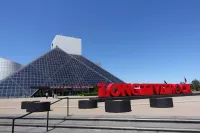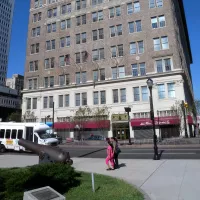Bahrain, officially the Kingdom of Bahrain, is an island country in West Asia located on the Persian Gulf. It consists of an archipelago of both natural and artificial islands, with Bahrain Island comprising the majority of its landmass. Situated between Qatar and Saudi Arabia (connected via the King Fahd Causeway), Bahrain has a population of over 1.5 million, comprised of Bahraini nationals and a diverse expatriate community. With an area of approximately 760 square kilometers, it is the third-smallest nation in Asia. The capital and largest city is Manama.
1903: Hermann Burchardt Visits Bahrain
In 1903, German explorer Hermann Burchardt visited Bahrain and photographed historical sites, including the old Qaṣr es-Sheikh.
1911: Bahraini Merchants Demand Restrictions on British Influence
In 1911, Bahraini merchants demanded restrictions on the British influence in the country, leading to the arrest and exile of the group's leaders to India.
1919: Beginning of modern government school system
1919 marked the beginning of modern government school system in Bahrain when the Al-Hidaya Al-Khalifia School for boys opened in Muharraq.
1919: Establishment of First Modern School
In 1919, the country's first modern school was established as part of administrative reforms.
1923: British Introduce Administrative Reforms
In 1923, the British introduced administrative reforms and replaced Sheikh Issa bin Ali with his son.
1926: Second government school for boys
In 1926, the Education Committee opened the second government school for boys in Manama.
1927: Rezā Shāh Demands Sovereignty Over Bahrain
In 1927, Rezā Shāh of Iran demanded sovereignty over Bahrain, prompting Belgrave to encourage Shia-Sunni conflicts to limit Iranian influence.
1928: First government school for girls
In 1928, the first government school for girls was opened in Muharraq.
1929: Bridge connecting Manama to Muharraq
In 1929, a bridge connected Manama to Muharraq.
1932: Oil Discovered by Bapco
In 1932, the Bahrain Petroleum Company (Bapco), a subsidiary of the Standard Oil Company of California (Socal), discovered oil.
1932: Peak in Transits after Airport Construction
In 1932, transits between Manama and Muharraq peaked after the construction of the Bahrain International Airport.
1937: Abolition of Slavery
In 1937, slavery was abolished in Bahrain as part of administrative reforms.
September 1939: Bahrain Joins World War II
In September 1939, Bahrain joined the Allied side in the Second World War.
October 1940: Italian Bombers Attack Bahrain
In October 1940, four Italian SM.82s bombers attacked Bahrain alongside Dhahran oilfields, damaging Allied-operated oil refineries and prompting upgrades to Bahrain's defenses.
1941: New causeway construction
In 1941, a new causeway replaced the old wooden bridge connecting Manama to Muharraq.
1948: American Naval presence established in Bahrain
An American naval presence has existed in Bahrain since 1948.
1948: Jewish Community Fleeing Bahrain
In 1948, rising hostilities and looting caused most members of Bahrain's Jewish community to abandon their properties and flee to Bombay.
1957: Charles Belgrave Advises the Ruler
In 1957, Charles Belgrave, who had been an adviser to the ruler, ended his de facto rule over Bahrain.
1957: First public hospital to open in Bahrain
In 1957, the first public hospital to open in Bahrain was the Salmaniya Medical Complex, in the Salmaniya district of Manama.
1960: Bahrain's Universal Healthcare System
Bahrain has had a universal health care system since 1960. Government-provided health care is free to Bahraini citizens and heavily subsidised for non-Bahrainis.
1965: Bahrain Petroleum Company Uprising
In 1965, a month-long uprising broke out after hundreds of workers at the Bahrain Petroleum Company were laid off.
August 1971: Bahrain Declares Independence and Signs Treaty with Britain
In August 1971, Bahrain declared its independence after a UN referendum, signing a new treaty of friendship with Britain.
1971: Bahrain Declares Independence
In 1971, Bahrain declared its independence after being a protectorate of the United Kingdom.
1973: First Parliamentary Elections
In 1973, Bahrain held its first parliamentary elections.
1975: Start of the "State Security Law Era"
The year 1975 marks the beginning of the "State Security Law Era" in Bahrain, characterized by widespread human rights violations.
1976: Legalization of homosexuality
Bahrain legalized homosexuality in 1976, though arrests have occurred under public immorality laws.
1976: Consensual homosexual relations legalized in Bahrain
Since 1976, consensual male and female homosexual relations between adults over the age of 21 are legal in Bahrain, making it the only Muslim Gulf country where it is legal.
1979: Iranian Revolution
In 1979, the revolution in Iran caused the bahraini Shia population to orchestrate a failed coup attempt under the auspices of a front organisation, the Islamic Front for the Liberation of Bahrain in 1981.
1981: Bahrain blames Iran for a failed coup attempt
In 1981, Bahrain experienced a failed coup, which it blames on Iran, leading to tense relations between the two countries.
1981: Establishment of Batelco
In 1981, Bahrain's telecommunications sector officially started with the establishment of Bahrain's first telecommunications company, Batelco, and there were more than 45,000 telephones in use in the country.
1981: Failed Coup Attempt by Bahraini Shia Population
In 1981, the Bahraini Shia population orchestrated a failed coup attempt under the auspices of the Islamic Front for the Liberation of Bahrain, following the 1979 revolution in Iran.
December 1986: Completion of King Fahd Causeway
In December 1986, the King Fahd Causeway, measuring 24 km (15 mi), was completed, linking Bahrain with the Saudi Arabian mainland via the island of Umm an-Nasan and financed by Saudi Arabia.
1986: Start of Publication Count at University of Bahrain
From 1986 to 2014, staff at the University of Bahrain published 5,500 papers and books.
1986: Establishment of the University of Bahrain
In 1986, the University of Bahrain was established.
1990: Forest Cover Area
In 1990, forest cover in Bahrain was around 220 hectares (ha).
December 1994: Civil Unrest Following Marathon Incident
In December 1994, civil unrest broke out after a clash with police resulting from youths throwing stones at female runners during an international marathon.
1994: Popular Uprising
A popular uprising occurred from 1994 to 2000 in which leftists, liberals and fundamentalists joined forces.
1995: Internet Connectivity
Bahrain has been connected to the internet since 1995 with the country's domain suffix being '.bh'.
1999: Mobile contracts
By 1999, Batelco had more than 100,000 mobile contracts.
1999: King Hamad Al Khalifa succeeds his father and introduces reforms
In 1999, Emir (now King) Hamad Al Khalifa succeeded his father Isa Al Khalifa, introducing reforms that significantly improved human rights conditions, described by Amnesty International as a "historic period of human rights".
1999: Hamad bin Isa Al Khalifa Becomes Emir
In 1999, Hamad bin Isa Al Khalifa became the Emir of Bahrain, leading to the end of the popular uprising and subsequent reforms.
2000: Internet Users in Bahrain
In 2000, the number of Bahraini internet users was 40,000.
2000: End of Popular Uprising
The popular uprising ended in 2000 after Hamad bin Isa Al Khalifa became the Emir of Bahrain in 1999.
February 2001: Referendum Massively Supports National Action Charter
In February 2001, a referendum showed massive support for the National Action Charter.
October 2001: Bahrain Participates in Military Action Against the Taliban
In October 2001, Bahrain participated in military action against the Taliban, deploying a frigate in the Arabian Sea for rescue and humanitarian operations.
2001: Religious Demographics
According to the 2001 census, 81.2% of Bahrain's population was Muslim, 10% were Christian, and 9.8% practised Hinduism or other religions.
2001: America designates Bahrain a major non-NATO ally
In 2001, America designated Bahrain a major non-NATO ally.
2001: Bahrain's Merchant Fleet
In 2001, Bahrain had a merchant fleet of eight ships of 1,000 GT or over, totaling 270,784 GT.
2001: Formation of international universities
In 2001, the National Action Charter paved the way for the formation of international universities such as the Ahlia University in Manama and University College of Bahrain in Saar.
February 2002: Bahrain Changes Name to Kingdom of Bahrain
On 14 February 2002, Bahrain changed its formal name from the State of Bahrain to the Kingdom of Bahrain, as part of the adoption of the National Action Charter.
2002: Implementation of telecommunications law
In 2002, Bahrain implemented its telecommunications law which included the establishment of an independent Telecommunications Regulatory Authority (TRA).
2002: Bahrain Declared a Semi-Constitutional Monarchy
In 2002, Bahrain was declared a semi-constitutional monarchy, with sharia law becoming a principal source for legislation.
2002: Parliamentary Elections Boycotted by Al Wefaq
In 2002, parliamentary elections were held and boycotted by the opposition, Al Wefaq.
2002: Roadways in Bahrain
In 2002, there were 3,164 km (1,966 mi) of roadways in Bahrain, of which 2,433 km (1,512 mi) were paved.
2002: Women acquire voting rights and right to stand in national elections
In 2002, women in Bahrain gained the right to vote and stand in national elections. However, no women were elected to office in that year's polls.
2003: Bahrain Bans Capture of Sea Cows, Marine Turtles and Dolphins
In 2003, Bahrain banned the capture of sea cows, marine turtles and dolphins within its territorial waters.
2003: Bahrain Opposes Invasion of Iraq
In 2003, Bahrain opposed the American-led invasion of Iraq and offered Saddam Hussein asylum.
April 2004: Inaugural Gulf Air Bahrain Grand Prix
On April 4, 2004, Bahrain hosted the inaugural Gulf Air Bahrain Grand Prix, marking the first Formula One race held in an Arab country.
2004: Free Trade Agreement with America
In 2004, Bahrain negotiated a free trade agreement with America following the political liberalization of the country.
2004: Bahrain signs Free Trade Agreement
In 2004, Bahrain signed the Bahrain–US Free Trade Agreement, aiming to reduce trade barriers between Bahrain and the United States.
2004: "King Hamad Schools of Future" project introduced
In 2004, King Hamad ibn Isa Al Khalifa introduced the "King Hamad Schools of Future" project, which uses Information Communication Technology to support K–12 education in Bahrain.
2004: Nada Haffadh becomes first female cabinet minister
In 2004, Nada Haffadh was appointed as Minister of Health, becoming the country's first female cabinet minister.
2004: Zain starts operations
In 2004, Zain (a rebranded version of MTC Vodafone) started operations in Bahrain.
2004: Royal College of Surgeons in Ireland sets up medical university
In 2004, the Royal College of Surgeons in Ireland (RCSI) set up a constituent medical university in the country.
2005: Bahrain Grand Prix in 2005
In 2005, Bahrain hosted the Bahrain Grand Prix.
2005: Inaugural Spring of Culture festival
In 2005, Bahrain started hosting an annual festival titled Spring of Culture, held in March, featuring internationally renowned musicians and artists performing in concerts.
2005: Qal'at al-Bahrain UNESCO World Heritage Site
In 2005, Qal'at al-Bahrain, a fort and archaeological complex, was inscribed as a UNESCO World Heritage Site.
2005: Scientific output
In 2005, scientific output from Bahrain was at 93 articles.
2005: Royal University for Women established
In 2005, the Royal University for Women (RUW) was established in Bahrain.
2005: Government calls off Shia branch of "Family law" after protests
In 2005, the government called off the Shia branch of the "Family law" after over 100,000 Shia took to the streets in protest. Muslim fundamentalists opposed the law, while women activists supported it, leading to a rally of 500 participants. Ghada Jamsheer criticized the government for using the law as a "bargaining tool with opposition Islamic groups".
June 2006: Parliamentary session discusses UN convention
During a parliamentary session in June 2006, Sheikh Adel Mouwda voiced the Asalah party's objections to ratifying the United Nations' International Convention on Civil and Political Rights, claiming it was tailored by Bahrain's enemies to serve their interests, and alleging the presence of American Embassy observers to ensure the convention's passage.
2006: Parliamentary Elections Won by Al Wefaq
In 2006, Al Wefaq won a majority in the parliamentary elections.
2006: Bahrain hosted its inaugural Australian V8 Supercar event
In 2006, Bahrain hosted its inaugural Australian V8 Supercar event, known as the "Desert 400", at the Sakhir circuit.
2006: Bahrain heads the United Nations General Assembly and appoints Haya bint Rashid Al Khalifa as President
In 2006, Bahrain was elected to head the United Nations General Assembly and appointed Haya bint Rashid Al Khalifa, a lawyer and women's rights activist, as President of the United Nations General Assembly. Female activist Ghada Jamsheer criticized the government's use of women's rights as a "decorative tool".
2006: Lateefa Al Gaood becomes first female MP
In 2006, Lateefa Al Gaood became the first female MP in Bahrain, winning by default.
2006: Bahrain hosted the opening Grand Prix of the 2006 season
On March 12, 2006, Bahrain hosted the opening Grand Prix of the Formula One season, which was won by Fernando Alonso of Renault.
2007: Unemployment benefits instituted
In 2007, Bahrain became the first Arab country to institute unemployment benefits as part of a series of labour reforms instigated under Minister of Labour, Majeed Al Alawi.
2007: Bahrain's population
In 2007, Bahrain's population crossed the one million mark with 1.05 million people of which 517,368 were non-nationals.
2007: Human rights conditions decline with renewed torture
In 2007, human rights conditions in Bahrain began to decline with the renewed use of torture.
August 2008: Increase in Number of Islands
By August 2008, the number of islands and island groups in Bahrain had increased to 84 due to extensive land reclamation projects.
October 2008: Launch of 'Vision 2030'
In October 2008, the Bahraini government introduced 'Vision 2030', a long-term economic plan to transform Bahrain into a diversified and sustainable economy.
November 2008: Agreement signed to establish a Regional Centre for Information and Communication Technology in Manama
In November 2008, an agreement was signed to establish a Regional Centre for Information and Communication Technology in Manama under the auspices of UNESCO, aiming to create a knowledge hub for the six-member states of the Gulf Cooperation Council.
2008: Remaining Jews in Bahrain
As of 2008, 37 Jews remained in Bahrain.
2008: Start of collaboration between Bahraini scientists
Between 2008 and 2014, Bahraini scientists collaborated most frequently with their peers from Saudi Arabia (137 articles).
2008: Fastest-Growing Financial Centre
In 2008, Bahrain was named the world's fastest-growing financial centre by the City of London's Global Financial Centres Index.
2008: Field Marshal Khalifa bin Ahmed Al Khalifa becomes Commander-in-Chief of the BDF
In 2008, Field Marshal Khalifa bin Ahmed Al Khalifa became the Commander-in-Chief of the Bahrain Defence Force (BDF).
2008: Houda Nonoo appointed ambassador to America
In 2008, Houda Nonoo was appointed as Bahrain's ambassador to America, making her the first Jewish ambassador of any Arab country.
2008: Indian nationals living in Bahrain
In 2008, approximately 290,000 Indian nationals lived in Bahrain.
2008: Bahrain Economic Vision 2030 published
In 2008, the Bahraini Economic Vision 2030 was published.
2008: Jobless figure
In 2008, the jobless figure in Bahrain was at 4%, with women overrepresented at 85% of the total.
2008: Passengers transiting through the King Fahd Causeway
In 2008, there were 17,743,495 passengers transiting through the King Fahd Causeway.
2009: Sudan's investment in education
In 2009, Sudan's investment in education was at 2.2% of GDP.
2009: Internet access statistics
In 2009, internet access was at 53% in both Bahrain and Qatar. In the United Arab Emirates, 64% of the population had access to the internet.
2009: Foundation of the Bahrain Centre for Strategic, International, and Energy Studies
In 2009, the Bahrain Centre for Strategic, International, and Energy Studies was founded to undertake research with a focus on strategic security and energy issues to encourage new thinking and influence policymaking.
2010: Parliamentary Elections Won by Al Wefaq
In 2010, Al Wefaq won a majority in the parliamentary elections.
2010: Bahrain's Population Growth
In 2010, Bahrain's population grew to 1.2 million, including 568,399 Bahraini nationals and 666,172 non-nationals.
2010: VIVA provides mobile services
In 2010, VIVA (owned by STC Group) became the third company to provide mobile services in Bahrain.
2010: Al Khalifa Family in Cabinet
In 2010, about half of the cabinet was composed of the Al Khalifa family.
2010: V8 Supercars returned to Bahrain
In 2010, the V8 Supercars returned to the Sakhir circuit for the last time, marking the second event of the series that year.
2010: Non-Muslim residents
In 2010, the non-Muslim Bahraini residents numbered 367,683 per the 2010 census, most of whom are Christians.
2010: Muslim Proportions
The 2010 census records that the Muslim proportion had fallen to 70.2%.
2011: Students studying in government schools
As of 2011, there are a total of 126,981 students studying in government schools.
2011: Bloggers detained during protests
Bloggers and other netizens were among those detained during protests in 2011.
2011: Ali Al Shargawi described as literary icon
In 2011, Ali Al Shargawi was described as the literary icon of Bahrain.
2011: Alice Samaan appointed ambassador to Britain
In 2011, Alice Samaan, a Christian woman, was appointed as Bahrain's ambassador to Britain.
2011: Arab Spring-Inspired Protests
In 2011, Bahrain experienced protests inspired by the regional Arab Spring, leading to criticism of the Al Khalifa royal family for human rights violations.
2011: Bahrain criticized for crackdown on the Arab Spring uprising
In 2011, Bahrain faced criticism for its crackdown on the Arab Spring uprising, with a government-appointed commission confirming reports of grave human rights violations, including systematic torture.
2011: Bahrain participates in Saudi Arabian-led intervention in Yemen
In 2011, Bahrain participated in the Saudi Arabian-led intervention in Yemen against the Houthis and forces loyal to former President Ali Abdullah Saleh.
2011: Bahrain's Economic Freedom Ranking
In 2011, Bahrain was ranked as having the freest economy in the Middle East and twelfth-freest overall in the world, according to the Index of Economic Freedom published by The Heritage Foundation and The Wall Street Journal.
2011: GDP Growth Rate Decrease
In 2011, Bahrain's GDP growth rate decreased to 1.3%, the lowest since 1994, due to the Great Recession and the Bahraini uprising.
2011: Human Rights Watch describes Bahrain's human rights situation as "dismal"
In 2011, Human Rights Watch described Bahrain's human rights situation as "dismal", leading to a decline in international rankings.
2011: Mohammed Ramadhan and Husain Moosa lead pro-democracy protests
In 2011, Mohammed Ramadhan and Husain Moosa were leading figures in the pro-democracy protests in Bahrain.
2011: Parliamentary By-Election After Al Wefaq Resignations
In 2011, a by-election was held to replace 18 members of Al Wefaq who resigned in protest against government crackdown.
2011: Crackdown on Journalists and Media
In 2011, during anti-government protests in Bahrain, journalists were targeted by officials. Editors from Al-Wasat were sacked and fined for publishing "false" news, and foreign correspondents were expelled. A commission found state media coverage inflammatory, with opposition groups lacking mainstream media access, and recommended relaxing censorship.
2011: Bahraini uprising
In 2011, most of the protestors in the Bahraini uprising were Shia.
2011: Bahrain Grand Prix cancelled due to anti-government protests
In 2011, the Bahrain Grand Prix was cancelled due to ongoing anti-government protests in the country.
2011: Shia Protests Against Sunni Rulers
In early 2011, inspired by the Arab Spring, Bahrain's Shia population started large protests against its Sunni rulers, leading to government crackdowns and clashes.
March 2012: Centre hosted two high-level workshops on ICTs and education
In March 2012, the Regional Centre for Information and Communication Technology in Manama hosted two high-level workshops focusing on Information and Communication Technologies (ICTs) and education.
April 2012: Human rights violations persist according to Amnesty International and Human Rights Watch reports
In April 2012, reports by Amnesty International and Human Rights Watch indicated that the human rights violations that occurred during the Arab Spring crackdown in 2011 were still ongoing, despite government promises of reform.
June 2012: Bahrain has 961,000 internet users
By June 2012, Bahrain had 961,000 internet users.
2012: Bahrain maintains a network of embassies
As of 2012, Bahrain maintains a network of 25 embassies, three consulates and four permanent missions to the Arab League, United Nations and European Union respectively.
2012: Manama Arab Capital of Culture
In 2012, Manama was named the Arab Capital of Culture by the Arab League.
2012: Bahrain Grand Prix occurred despite concerns
In 2012, the Bahrain Grand Prix took place despite concerns over the safety of teams and ongoing anti-government protests, drawing considerable controversy.
2012: Bahraini government revokes citizens' nationality
In 2012, the Bahraini government revoked the nationality of some of its citizens.
2012: Government devoted 2.6% of GDP to education
In 2012, the government of Bahrain allocated 2.6% of its GDP to education, which was one of the lowest ratios in the Arab world, comparable to Lebanon.
August 2013: Licensed Internet Service Providers
As of August 2013, the TRA has licensed 22 Internet Service Providers.
2013: Bahrain topped the Arab world for internet penetration
In 2013, Bahrain led the Arab world in internet penetration, with 90% of the population having access. The United Arab Emirates (86%) and Qatar (85%) followed behind.
2013: Investment in research and development
In 2013, Bahrain's investment in research and development was reported to be 0.04% of GDP, though the data was incomplete.
2013: Manama Capital of Arab Tourism
In 2013, Manama was named the Capital of Arab Tourism by the Arab League.
2013: Data covers higher education sector
In 2013, data on the contribution of women to research only covered the higher education sector.
2013: Launch of the Bahrain Science Centre
In 2013, the Bahrain Science Centre was launched as an interactive educational facility targeting 6- to 18-year-olds, covering topics including junior engineering, human health, the five senses, Earth sciences, and biodiversity.
2013: Global average of articles
In 2013, the global average was 176 articles per million inhabitants.
2013: Researchers in the higher education sector
In 2013, the number of researchers in Bahrain's higher education sector was equivalent to 50 per million inhabitants.
2013: Investment in research and development remained very low
Investment in research and development remained very low in Bahrain in 2013.
March 2014: Casualties from Government Usage of Tear Gas
As of March 2014, more than 80 civilians and 13 policemen have been killed. 34 civilian deaths were related to government usage of tear gas originally manufactured by America-based Federal Laboratories.
April 2014: Launch of National Space Science Agency
In April 2014, Bahrain launched its National Space Science Agency, which has been working to ratify international space-related agreements and plans to establish infrastructure for the observation of both outer space and the Earth.
October 2014: Bahrain is rated as "Not Free" by Freedom House
As of October 2014, Bahrain is ruled by an "authoritarian regime" and is rated as "Not Free" by the America-based non-governmental organization Freedom House.
2014: Collaboration between Bahraini scientists
Between 2008 and 2014, Bahraini scientists collaborated most frequently with their peers from Saudi Arabia (137 articles).
2014: Female university graduates in science and engineering
In 2014, Bahrain was among the Arab states with a majority of female university graduates in science and engineering. Women accounted for 66% of graduates in natural sciences, 28% in engineering, and 77% in health and welfare.
2014: Bahraini scientific article publications
In 2014, Bahraini scientists published 155 articles in internationally catalogued journals, according to Thomson Reuters' Web of Science (Science Citation Index Expanded).
2014: Manama Capital of Asian Tourism
In 2014, Manama was named the Capital of Asian Tourism.
2014: Mohammed Ramadhan and Husain Moosa arrested and accused of killing a police officer
In 2014, Mohammed Ramadhan and Husain Moosa were arrested and accused of killing a police officer.
2014: University of Bahrain Student and Faculty Statistics
In 2014, the University of Bahrain had over 20,000 students, 65% of whom were women, and around 900 faculty members, 40% of whom were women. The university spent about US$11 million on research.
2015: Amnesty International report points to continued suppression of dissent in Bahrain
Amnesty International's 2015 report on Bahrain highlights continued suppression of dissent, restricted freedom of expression, unjust imprisonment, and torture of citizens.
2015: Public Ownership of Forest
In 2015, 100% of the forest area was reported to be under public ownership.
July 2016: European Parliament condemns human rights abuses in Bahrain
On July 7, 2016, the European Parliament adopted a resolution condemning human rights abuses by Bahraini authorities, calling for an end to repression against human rights defenders, political opposition, and civil society.
2016: Low Biocapacity per person
In 2016, Bahrain had 0.52 global hectares of biocapacity per person within its territory, much less than the world average of 1.6 global hectares per person.
2016: Manama Gulf Capital of Tourism
In 2016, Manama was named the Gulf Capital of Tourism by The Gulf Cooperation Council.
2016: Bahrain cuts diplomatic ties with Iran
In 2016, following the storming of the Saudi embassy in Tehran, Bahrain cut diplomatic relations with Iran.
August 2017: American Secretary of State speaks against discrimination of Shias in Bahrain
In August 2017, American Secretary of State Rex Tillerson criticized the discrimination against Shias in Bahrain regarding government employment, education, and the justice system.
September 2017: American State Department approves arms sales packages to Bahrain
In September 2017, the American State Department approved arms sales packages worth more than $3.8 billion to Bahrain, including F-16 jets, upgrades, missiles and patrol boats.
2017: Influx in global athletes for Mixed Martial Arts training
During 2017, Bahrain recorded an influx in global athletes visiting the nation for Mixed Martial Arts training.
2017: Bahrain Victorius participated in the 2017 Tour de France
In 2017, Bahrain Victorius, the UCI WorldTeam cycling team sponsored by the government of Bahrain, participated in the Tour de France.
January 2018: Bahraini government expels citizens after revoking their nationality
On January 31, 2018, Amnesty International reported that the Bahraini government expelled four of its citizens after having revoked their nationality in 2012, rendering them stateless.
February 2018: Human rights activist Nabeel Rajab sentenced to further jail time
On February 21, 2018, human rights activist Nabeel Rajab was sentenced to an additional five years in jail for tweets and documentation of human rights violations.
April 2018: Official opening of the British Royal Navy base at Mina Salman
In April 2018, the permanent British Royal Navy base at Mina Salman, HMS Jufair, was officially opened.
2018: Introduction of Cricket in Bahrain
In 2018, Cricket was introduced in Bahrain under the initiative of KHK Sports and Exelon.
2018: Religious freedom in Bahrain
In 2018, the US Department of State's report on religious freedom in Bahrain estimated that Shias constituted approximately 55% of Bahrain's citizen population.
January 2019: Introduction of Value Added Tax (VAT)
On January 1, 2019, the Kingdom of Bahrain introduced the Value Added Tax (VAT), a multipoint tax on the sale of goods and services, managed by the national bureau of revenue, with an initial rate of 5%.
October 2019: Opening of The Avenues shopping mall
In October 2019, The Avenues, a waterfront shopping mall, opened in Bahrain as part of economic reforms to improve its financial dependency and boost its image as a tourist destination.
2019: Visitor Arrivals
In 2019, Bahrain received over eleven million visitors, mostly from surrounding Arab states, but also an increasing number from outside the region, drawn by heritage and events like the Bahrain Grand Prix.
2019: Bahrain wins West Asian Football Federation cup and Arabian Gulf Cup
In 2019, Bahrain's national football team, managed by Helio Sousa, achieved victory in both the West Asian Football Federation cup and the Arabian Gulf Cup.
2019: Bahrain International Airport passenger traffic
In 2019, the Bahrain International Airport (BAH) handled almost 100,000 flights and more than 9.5 million passengers.
2019: American University of Bahrain established
The American University of Bahrain was established in 2019.
July 2020: Bahrain's highest court upholds death sentences for pro-democracy campaigners
In July 2020, a government watchdog in Bahrain claimed that the confessions of Mohammed Ramadhan and Husain Moosa, leading figures in the 2011 pro-democracy protests, were extracted by torture. On July 13, 2020, Bahrain's highest court upheld their death sentences, a decision criticized by human rights advocates.
August 2020: Kingdom of Bahrain bought stake in Paris F.C.
In August 2020, The Kingdom of Bahrain acquired a minority stake in Paris F.C., a French second-tier soccer club, sparking criticism over potential whitewashing of human rights issues.
August 2020: HMS Clyde transferred to the Royal Bahrain Naval Force
On August 7, 2020, HMS Clyde was transferred to the Royal Bahrain Naval Force, renamed RBNS Al-Zubara.
2020: Bahrain and Israel establish bilateral relations
In 2020, Bahrain and Israel established bilateral relations under the Bahrain–Israel normalisation agreement.
2020: Public debt reaches $44.5 billion
In 2020, Bahrain's public debt reached $44.5 billion, equivalent to 130% of its GDP.
2020: Human rights situation did not improve in Bahrain
In 2020, the human rights situation did not improve in Bahrain.
2020: Forest Cover Area
In Bahrain forest cover is around 1% of the total land area, equivalent to 700 hectares (ha) of forest in 2020.
January 2021: Human Rights Watch publishes World Report 2021
In January 2021, the Human Rights Watch's World Report 2021 revealed that human rights conditions in Bahrain did not improve in 2020, highlighting increased repression against social media activities, upheld death sentences after unfair trials, prosecution of critics, and denial of medical treatment to opposition figures in detention.
January 2021: Opening of new airport terminal
On January 28, 2021, Bahrain opened its new airport terminal as part of its economic vision 2030, capable of handling 14 million passengers.
March 2021: Reports of children being abused after detentions
In March 2021, Human Rights Watch (HRW) and the Bahrain Institute for Rights and Democracy (BIRD) reported that 13 children, aged between 11 and 17, were allegedly beaten, threatened with rape, and subjected to electric shocks after being detained in protest-related cases.
2021: Freedom House continues to label Bahrain as "not free"
In its 2021 report, Freedom House continues to label Bahrain as "not free".
January 2022: VAT rate increase
On January 1, 2022, the VAT rate in Bahrain increased from 5% to 10%.
2022: Full recovery of employment
As of Q4 2022, total employment in Bahrain stood at 746,145 workers, which represented a full recovery of employment since the downturn caused by the COVID pandemic.
2023: Bahrain's Electoral Democracy Ranking
According to the V-Dem Democracy indices Bahrain is 2023 the 4th least electoral democratic country in the Middle East.
2023: High Greenhouse Gas Emitter Per Capita
In 2023, Bahrain was the second highest greenhouse gas emitter per capita, at approximately 42 tonnes per person.
2023: Bahrain Population
In 2023, Bahrain's population was recorded as 1,501,635, with 47% being Bahraini nationals and 53% expatriates from 2,000 ethnicities.
January 2024: Bahraini Navy receives second Oliver Hazard Perry-class frigate
On January 18, 2024, the Bahraini Navy received the former USS Robert G. Bradley, an Oliver Hazard Perry-class frigate, renamed RBNS Khalid bin Ali.
April 2024: Widespread Flooding After Heavy Rainfall
In April 2024, Bahrain experienced widespread flooding after heavy rainfall affected the Gulf region.
June 2024: Bahrain Olympic Academy received the Athena honorary distinction
On June 10, 2024, the Bahrain Olympic Academy was awarded the Athena honorary distinction for its contributions to advancing sports in the region, with Shaikh Khalid bin Hamad Al Khalifa receiving the medal.
2024: Bahrain's ranking in the Global Peace Index
According to the 2024 Global Peace Index, Bahrain is the 81st most peaceful country in the world.
2024: Bahrain ranked 72nd in the Global Innovation Index
In 2024, Bahrain was ranked 72nd in the Global Innovation Index.
2025: Metro system operational by 2025
The nationwide metro system in Bahrain is currently under construction and is due to be operational by 2025.
2026: Projected public debt increase
In 2026, the IMF estimates Bahrain's public debt will rise to 155% of GDP, primarily due to military expenditure.
2030: Bahrain Economic Vision 2030
In January 2021, Bahrain opened its new airport terminal as part of its economic vision 2030, capable of handling 14 million passengers.
2035: Greenhouse Gas Emission Reduction Target
Bahrain aims to reduce its greenhouse gas emissions by 30% by 2035.
2060: Commitment to Net Zero
Bahrain has committed to net zero by 2060.
Mentioned in this timeline
California is a U S state on the Pacific Coast...

Andrea Bocelli is a renowned Italian tenor who rose to...
Qatar is a country located on the Qatar Peninsula in...
Saudi Arabia officially the Kingdom of Saudi Arabia KSA is...
India officially the Republic of India is a South Asian...

The Boeing Company is a multinational corporation and one of...
Trending

1 hour ago Mike Tirico's Inspiring Olympic Sign-Off: A Look at His Legacy in Sports Broadcasting.

1 hour ago Benny Blanco's Dirty Feet Video Sparks Internet Outrage and Divorce Suggestions for Selena Gomez.

1 hour ago Rock & Roll Hall of Fame Announces 2026 Nominees: Mariah, P!NK, Wu-Tang Clan Lead

1 hour ago Matthew Lillard Responds to Quentin Tarantino's Criticism, Appreciates Hollywood's Support After Feeling 'Punched'

2 hours ago New Jersey Schools impacted as a major blizzard brings record snowfall.
2 hours ago Rugby Property Assets acquires Cavendish Walk Shopping Centre in Merseyside for £1.5m.
Popular

Jesse Jackson is an American civil rights activist politician and...

Susan Rice is an American diplomat and public official prominent...

Barack Obama the th U S President - was the...

Michael Joseph Jackson the King of Pop was a highly...

XXXTentacion born Jahseh Dwayne Ricardo Onfroy was a controversial yet...

Bernie Sanders is a prominent American politician currently serving as...